
On August 17, a screening of the film Witnesses. Captivity Kills by directors Maryna Roshchyna and Tetyana Symon, followed by a protest demonstration in support of prisoners of war, took place in Lviv during the book exchange event “Book Square.”
The event, organized by the Community of Lviv Families of the Mariupol Garrison, opened at the square in front of the Taras Shevchenko monument and continued near the Ivan Franko monument. Participants marched in a procession from Shevchenko to Franko, reminding everyone: captivity kills.
The posters from the march were placed on the fence of the park, so that passersby could not help but notice the powerful messages: “Do Not Be Silent — Captivity Kills,” “The Missing Are Not Forgotten,” “Do Not Be Quiet When It Is Time to Yell,” and “Free Azov”, among others.
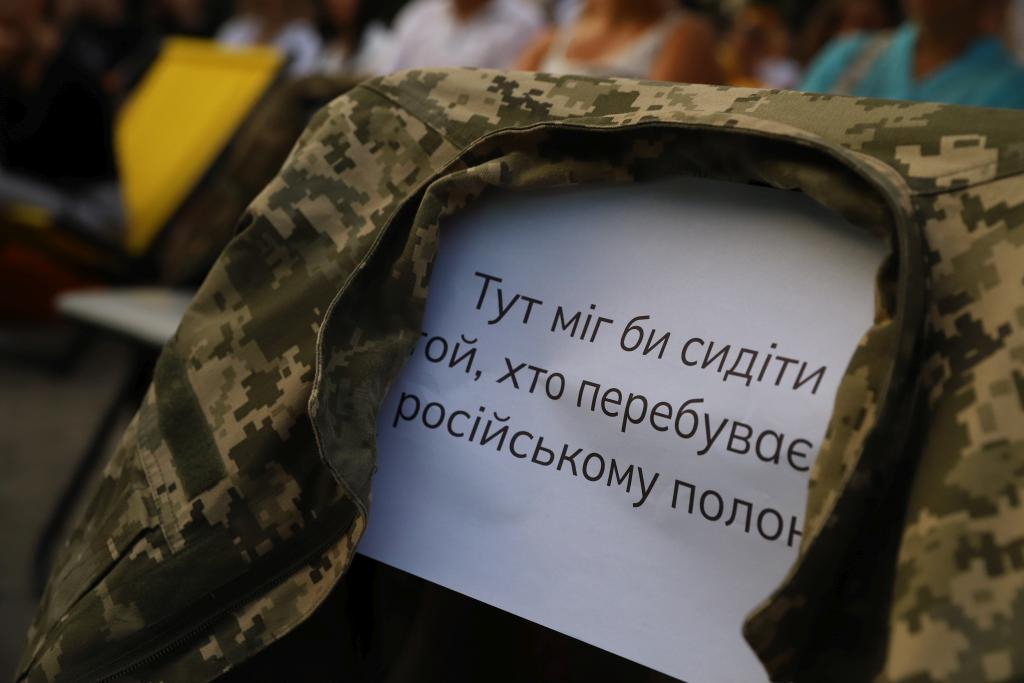
Posters speak louder than words
“Who do you have in captivity? Everyone!”
Participant of the protest, Alevtyna Shvetsova, coordinator of cultural initiatives and a journalist from Mariupol who spent 21 days under the blockade of the city together with her family, tells why these protests take place and why they are important.
“Demonstrations in Lviv are held on a regular basis, almost every weekend. They were initiated in 2022 by the families of the Mariupol Garrison living in Lviv. We know that some Garrison members have already returned home, but many relatives are still waiting for their sons and husbands. We call on as many people as possible to stand with slogans in order to remind Ukrainians at what cost we live a more or less civilian life, and the entire world that the issue of prisoners of war is the priority,” shared Alevtyna Shvetsova.
“Who do you have in captivity? Everyone!” This slogan is often heard at these demonstrations. It reflects the fact that many people without relatives or acquaintances in captivity still join the protests. Organizers also encourage participants to become the voices of prisoners of war in their social networks or, for example, place posters in coffee shops, cafés, restaurants, workplaces, and even their own homes, so that passersby cannot overlook them.
Much attention at the demonstrations is also dedicated to those missing in action. Those people remain in an informational vacuum, while their families live in uncertainty regarding the fate of their loved ones. Ex-PoWs also join the protests. Just yesterday, relatives and enthusiasts fought for their release from captivity, and today, they themselves have become the voices of their imprisoned brothers-in-arms. Veterans on rehabilitation in Lviv take part in the demonstrations as well.
“If our defenders have no excuses not to attend the demonstrations, then what excuses can there be for people who merely went for coffee in the center of Lviv or who came here for a walk? We emphasize that this is not just a way to spend your spare time, but a direct duty of all conscious Ukrainians,” Alevtyna added.
On August 17, the march to the Ivan Franko monument was organized within the framework of the 2025 “Book Square” book exchange and the screening of the documentary Witnesses. Captivity Kills.
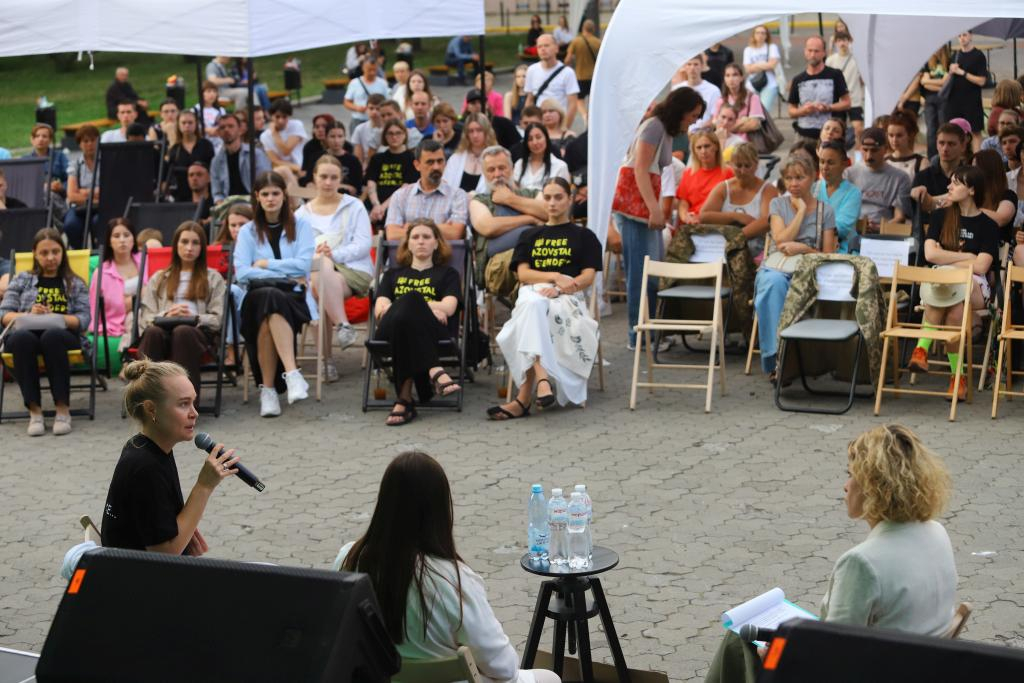
Voices of those who are waiting: the protest action in support of prisoners of war
Documenting reality
Witnesses. Captivity Kills is a 2024 documentary created by the team of the War Archive of the NGO Docudays. The project team recorded more than 750 interviews with witnesses of Russian war crimes, as well as with servicemen who returned from captivity as a result of prisoner exchanges. The film was directed by Tetyana Symon and Maryna Roshchyna.
On the night of 28–29 July 2025, an explosion destroyed the Olenivka penal colony, where Russians held the imprisoned Ukrainian PoWs. According to Ukrainian sources, at least 53 Ukrainian prisoners of war were killed in Olenivka, and more than 100 were injured. The Olenivka attack remains one of Russia’s gravest crimes. Independent observers and international organizations were never granted access to the site of the explosion — only Russian propagandists were allowed entry.
The documentary Witnesses. Captivity Kills is based on the testimonies of soldiers who survived captivity in Olenivka, interviews with the families of those still awaiting the return of their loved ones, as well as the few video and photographic materials from Mariupol recorded by eyewitnesses.
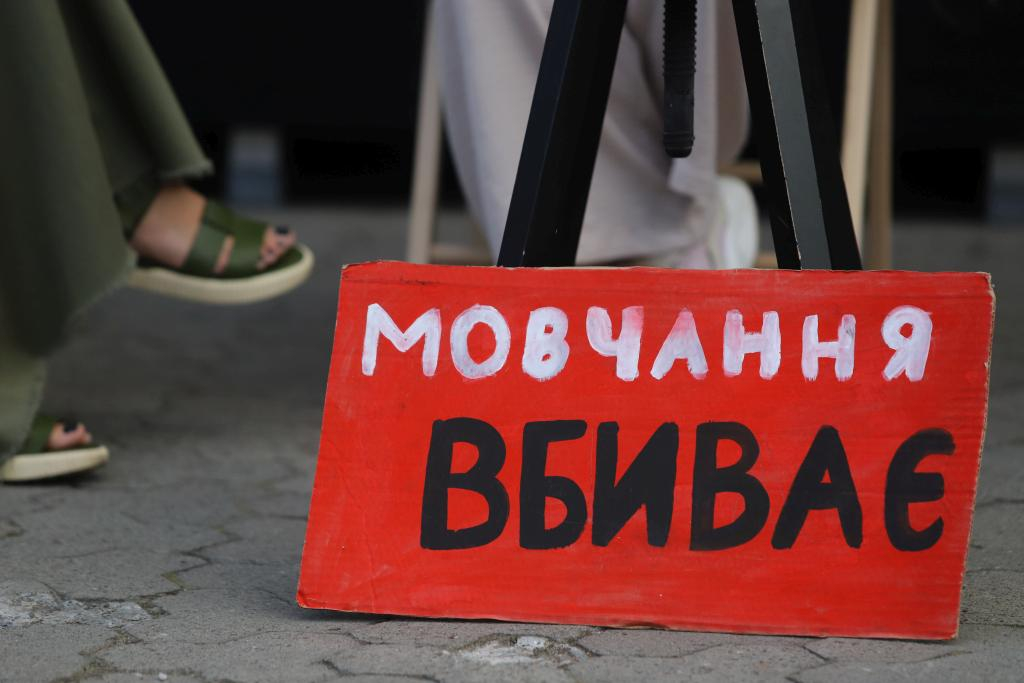
Posters with eye-catching slogans have become part of the urban landscape
Conversation with relatives of people who endured captivity
Before the screening of the 45-minute film about captivity, waiting, and memory, Viktoriya Berezanska and Tetyana Bondar, members of the community “Lviv Families of the Defenders of Azovstal,” shared their reflections. The event was moderated by Olya Pilishchuk, head of the Monitoring Group of the “Memorial” Memory Platform, journalist, and volunteer. Olya Pilishchuk once again emphasized the importance of joining demonstrations and speaking about prisoners of war.
Viktoriya Berezanska noted that the film Witnesses. Captivity Kills is, in effect, a diary, and it is crucial to keep one’s own diaries and record experiences immediately: over time, human memory might erase even the most significant moments.
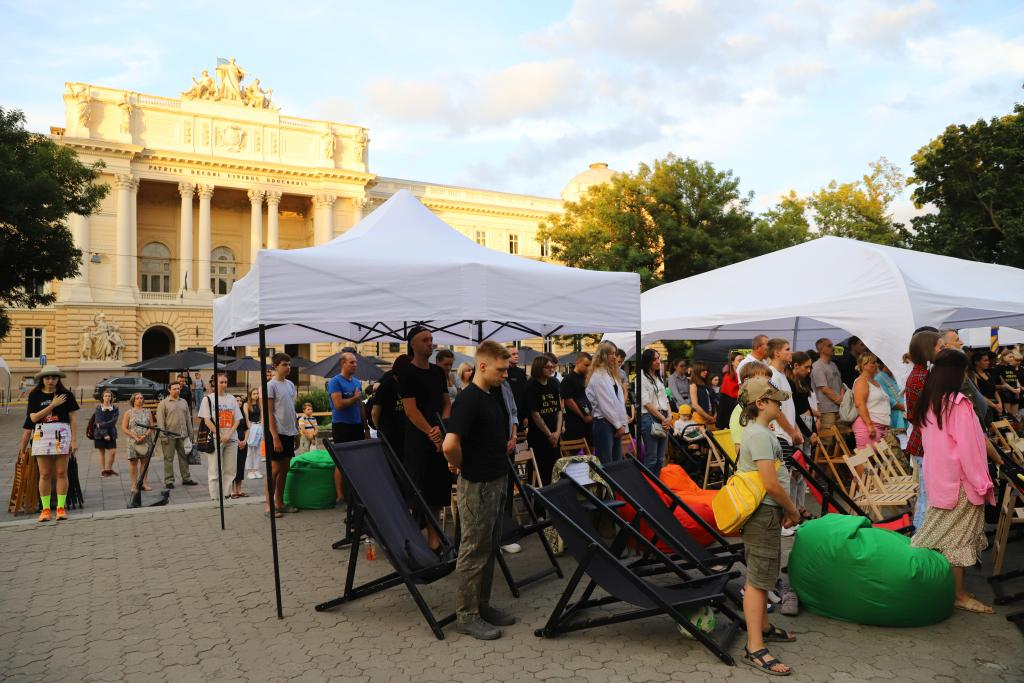
Every photo from the demonstration is filled with memory, pain, and hope.
Tetyana Telyuk, Viktoriya Berezanska’s aunt, a medic of the Azov Regiment with the call sign Kreshchena (“Godmother”), spent eight months in captivity. At the time of her imprisonment, she was 70 years old. The last time Viktoriya saw her aunt before her release was on a bus together with other prisoners. When Kreshchena returned from captivity, she weighed forty kilograms less.
According to Viktoriya, she was almost unrecognizable.
After her release, Tetyana Telyuk was asked whether public demonstrations could harm those who remain in captivity, and whether silence might be better. She responded that “we must not remain silent, but cry out.” Today, Kreshchena regularly participates in rallies reminding society about the prisoners of war of the Mariupol garrison, each of whom is still awaited at home.
The son of Tetyana Bodnar, an Azov Regiment fighter with the call sign Light, was hospitalized at Azovstal and captured after an injury. He spent one year and one month in captivity until the summer of 2023. He returned to active duty immediately after rehabilitation, earlier than planned, having declined treatment in Truskavets. “His morale is good, even better than ours, though physically he still faces certain health issues,” shared Tetyana Bodnar.
Tetyana emphasizes: “Our demonstrations are both a form of struggle and a means of rehabilitation. We want to act, and this gives us a sense that we are indeed helping to prevent the issue of the release of PoWs from being forgotten. It serves as a reminder both to society and to decision-makers. It is also a form of support for those who come back — they need to see that we fought for them, that they were not forgotten, that they are needed not only by their families.”
Photo: In everyone’s eyes, there is memory, pain, and hope.
A story from captivity
During the discussion after the film screening, Pavlo Popadyuk shared his story. It was his first time attending a rally in support of prisoners of war: previously, he’d find it difficult to be among so many people.
Pavlo Popadyuk serves in the 36th Marine Brigade. On 22 February 2022, he left his wife and two-month-old daughter; at the beginning of the full-scale invasion, he was in Mariupol. He was captured on April 12, 2022. At first, he was held in Olenivka. A month before the terror attack, he was transferred to the village of Sukhodilsk, to a penal colony in the temporarily occupied Luhansk region.
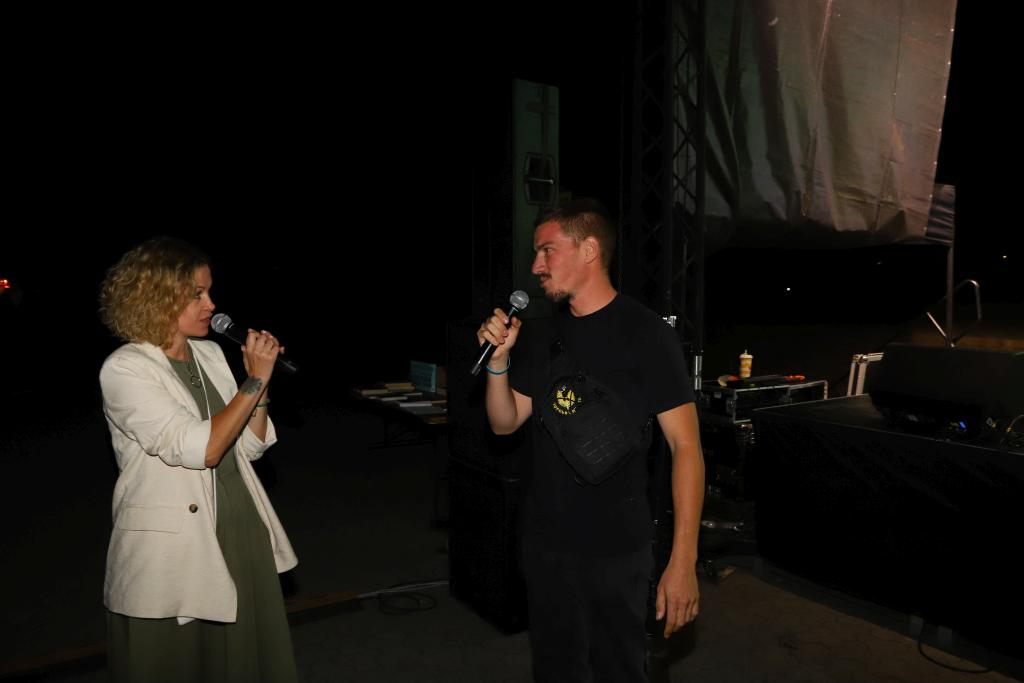
Conversation with Pavlo Popadyuk
In captivity, Pavlo and his fellow soldiers were constantly told that no one in Ukraine needed them, that neither the government nor fellow citizens cared about them, and that Ukrainians were afraid to take part in demonstrations. At first, the prisoners were assured that captivity would last only three to four months, yet these “several months” have turned into years.
The atrocities described by the witnesses in the film were nothing new to Pavlo. In Sukhodilsk, he and his buddies did not experience the same degree of physical abuse as in Olenivka, where his legs were constantly bruised from beatings with metal pipes. But that did not last long. One of the soldiers died after a grave shrapnel wound to his heart. Everyone was allowed to bid him farewell, kneeling, when one of his buddies said: “Heroes never die.” At that very moment, a brutal beating began. Abuse was constant — if not daily, then every other day.
After three years and one month, Pavlo was exchanged during the first major prisoner exchange “one thousand for one thousand.” He expresses endless gratitude to his wife, who fought for his release by every possible means — from writing songs about captivity to going on solitary protests outside the Verkhovna Rada. He is also deeply moved by the extent to which people support the demonstrations, by their engagement, and by the help they provide to the military.
Being the voice
From 23 to 31 August, an initiative is taking place in Lviv: people create posters and put them in public spaces, establishments, and institutions. Members of the Community of Lviv Families of the Mariupol Garrison are convinced that this format will reach even more people, helping them understand that captivity is hell, that silence and indifference kill, and that we must be the voices of the prisoners of war.
It is worth noting that the book exchange, literary discussions, and the screening of the documentary film held in Lviv on 17 August brought together more than five thousand people. Documentary films, as well as books, have the power to unite people, call them to action, and preserve memory.
Citing one of the posters, “Hold on to this memory — from now on, it is your sword.”
The film screening took place within the framework of the Traveling Docudays UA Film Club at the Lviv Municipal Library.
The “Book Square” book exchange is conducted with the financial support of the State Institution “Ukrainian Book Institute,” which is funded by taxpayers. The event is held with the support of the Department of Culture at the Office for Education and Culture of the Lviv City Council.
Text by Vira Karpinska
Photos by Yaroslav Tabinskyi; photos from the rally and march by Inna Hevko
The development of the DOCU/CLUB Network is funded by the Embassy of Sweden in Ukraine, the National Endowment for Democracy (NED) and Fondation de France.
The opinions, conclusions, or recommendations are those of the authors and compilers of this publication and do not necessarily reflect the views of the governments or charitable organizations of these countries. The authors and compilers are solely responsible for the content of this publication.



